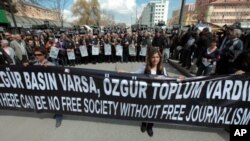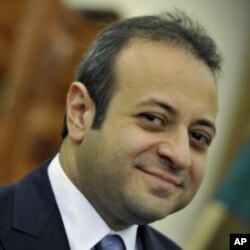Turkey has detained several journalists as part of an anti-terror probe.
Turkish news channels broadcast pictures of journalists being taken into police custody, after their homes were raided early Tuesday. The detentions are part of an anti-terror probe into what prosecutors allege is the "press and propaganda wing" of the banned Kurdish rebel group, the Kurdistan Workers' Party. A pro-Kurdish newspaper was also raided.
Worrying trend
The Turkish representative for U.S.-based Human Rights Watch, Emma Sinclair Webb, says the latest detentions are part of a worrying trend.
"The arrests represent a further clampdown on dissenting critical voices in Turkey," said Webb. "This has become a pattern, of the last few months. It has intensified since the general election. The trouble with Turkey's terrorism laws is that [they are] so widely drawn and vague that any of us can find ourselves suspect in terrorism investigation."
But Turkish Prime Minister Recep Tayyip Erdogan defends the ongoing probe, even making a thinly veiled threat against its critics, saying they should question their motives.
The probe, and another alleged conspiracy linked to the military called Ergenekon, have resulted in scores of journalists being jailed. The scale of the detentions has prompted the Organization for Security and Cooperation in Europe to intervene.
Detentions
OSCE representative for media freedom Dunja Mijatović met earlier this month with government officials.
"There are more people put in prison. Very long detention period - more than 1,000 days, sentences of 166 years in prison. So that in the end, we had to intervene," said Mijatović. "Of course, this issue of imprisonment, it cannot be treated as a technical issue because we are talking about people behind bars, about human beings. My office clearly spelled out to the government we do not [want] in anyway to interfere [with] the legitimate right of any government to fight terrorism. But this case of 66, at the moment, people that are journalists that are in prison in Turkey needs very urgent remedies."
Mijatović says she received commitments from the government to reform, but was not given a timetable for change. The OSCE concern follows that of the European Union, which Turkey is seeking to join. The EU annual report on Turkey, published in October, criticized Ankara about freedom of the press.
Government's position
But Turkish Minister for EU Affairs Egemen Bagis dismissed the criticisms.
"If you consider the report to be a photo of Turkey, what I can say is the model of the camera that took the picture of Turkey is an old model," said Bagis. "I think it is time for Europe to change the lens, and to focus better."
Earlier this month, Turkey signed a protocol with Russia to combat what both countries claim is the politicization of human rights by international bodies such as the OSCE. The Turkish government argues that rather than restricting media freedom, it has allowed more critical reporting on the military, once a taboo subject.
Political columnist Kadri Gurcel for the Turkish daily Milliyet acknowledges such reforms, but argues that old taboos have merely been replaced by new ones.
"There are new [taboos] erected," said Gurcel. "Reporting has become a quite difficult and ambiguous affair in Turkey. Because reporting on questions that the government does not wish anything reported on, it has become very risky."
The government's ending of the once omnipotent army's political power has seen Turkey being presented by some as a role model for emerging democracies of the Arab spring and the wider region.
Intimidation
But former Turkish ambassador and teacher of international relations at Kultur University, Murat Bilhan, says the journalist detentions and the resulting intimidation in the wider society is a worrying sign about what direction Turkey is heading. He says the removal of democratic checks on the government could have major regional repercussions.
"Turkey is changing to a civilian dictatorship now," said Bilhan. "If this continues like that, our allies and partners will feel [it] to their bones. Maybe hostile Turkey, more 'Arabized' Turkey, Turkey changing its identity."
The government dismisses such concerns, saying it is defending democracy, rather than threatening it. But with more journalists jailed nearly every month, observers say that argument will prove increasingly hard to sustain.





